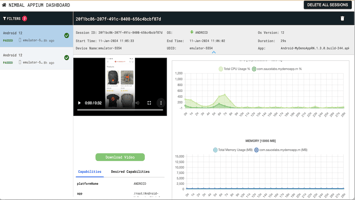In the fast-paced world of mobile app development, ensuring a seamless user experience across...
Overcoming Obstacles: Challenges of Implementing AI in Test Management
Explore the hurdles and difficulties faced when integrating AI into test management processes.
Understanding the Role of AI in Test Management
AI plays a crucial role in test management by automating various tasks and processes. It uses algorithms and machine learning techniques to analyze data, identify patterns, and make informed decisions. By understanding the role of AI in test management, organizations can leverage its capabilities to improve efficiency and effectiveness.
One of the key benefits of AI in test management is its ability to analyze large amounts of data quickly and accurately. This allows for faster and more reliable test execution, leading to improved product quality and reduced time-to-market. AI can also help in identifying test cases that are most likely to fail, allowing testers to prioritize their efforts and focus on critical areas.
Furthermore, AI can assist in test case generation by automatically creating test cases based on predefined criteria. This not only saves time but also ensures comprehensive test coverage. AI can also help in test result analysis by identifying patterns and anomalies in test outcomes, enabling testers to make informed decisions and take appropriate actions.
Overall, understanding the role of AI in test management is essential for organizations to fully harness its potential and overcome the challenges associated with its implementation.
Data Integration and Quality Control Challenges
One of the major challenges of implementing AI in test management is data integration. AI relies heavily on data for training and decision-making. However, integrating diverse and fragmented data from different sources can be complex and time-consuming. Organizations need to ensure that data is collected, consolidated, and standardized in a way that is compatible with AI algorithms.
Another challenge is maintaining data quality control. AI algorithms are only as good as the data they are trained on. If the data is incomplete, inaccurate, or biased, it can lead to unreliable results and erroneous decisions. Organizations need to establish robust data quality control measures to ensure the accuracy and integrity of the data used by AI in test management.
Addressing these challenges requires organizations to invest in data integration tools and technologies, establish data governance policies, and implement data quality control processes. By overcoming these challenges, organizations can ensure the successful implementation and utilization of AI in test management.
Automation and Human Oversight Balance
Achieving the right balance between automation and human oversight is another challenge when implementing AI in test management. While AI can automate repetitive and mundane tasks, it is important to have human oversight to ensure the accuracy and effectiveness of AI-generated test cases and results.
Organizations need to define clear roles and responsibilities for both AI systems and human testers. AI can handle routine tasks such as test case generation, execution, and result analysis, while human testers can focus on more complex and critical testing activities that require human intelligence and creativity.
Implementing a well-defined process for collaboration between AI systems and human testers is crucial to ensure the successful integration of AI in test management. Regular communication, feedback loops, and continuous improvement are essential to maintain the right balance between automation and human oversight.
Security Concerns in AI Test Management
With the increasing reliance on AI in test management, security concerns become a significant challenge. AI systems require access to sensitive and confidential test data, which can be a potential security risk if not properly protected.
Organizations need to implement robust security measures to protect the confidentiality, integrity, and availability of test data. This includes encryption, access controls, secure storage, and regular security audits. Additionally, organizations should also consider the ethical implications of using AI in test management and ensure that it complies with relevant data protection and privacy regulations.
By addressing security concerns proactively, organizations can minimize the risks associated with AI in test management and ensure the confidentiality and integrity of their test data.
Training and Adoption Issues
Training and adoption are critical challenges when implementing AI in test management. AI systems require training on historical data to learn and improve over time. Organizations need to invest time and resources in training AI models and algorithms to ensure their effectiveness and accuracy.
In addition, organizations need to overcome the resistance to change and ensure the adoption of AI systems by testers and other stakeholders. This requires proper communication, training, and support to help testers understand the benefits of AI in test management and overcome any skepticism or fear of job displacement.
Organizations should also provide ongoing support and training to ensure that testers can effectively utilize AI tools and technologies in their day-to-day testing activities. By addressing training and adoption issues, organizations can maximize the benefits of AI in test management and drive overall improvement in testing efficiency and effectiveness.



